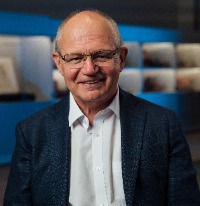News
David Bogle – My reflections as a former CRAC trustee
02/07/2025
David Bogle, former Trustee of CRAC from 2019-2025, shares his reflections and insights on the research sector after finishing his role as a Board member.
Why did you want to undertake a Trustee role at CRAC?
It has been a pleasure and a privilege to serve on the CRAC Board as a trustee. The mission of supporting researcher career development is as vital as ever as career journeys are more varied and changeable than they used to be for all but especially for young people. Because of the growth in numbers of researchers and the direct link to prosperity and solving social problems based on sound research, it is recognised that we need well trained and outward looking researchers.
I have witnessed this in my own experience over the last twenty years (as Pro-Vice-Provost of the Doctoral School and Early Career Researchers at UCL). Given my role at UCL overseeing early career researchers, I have been previously involved with CRAC and Vitae, and therefore I was keen to join the Board to help shape the national picture. My previous involvement included being chair of the 2018 review of the Concordat supported by Vitae, but even as a PhD student I went on a CRAC course in the early 1980s. I also wanted to encourage support for career development within Engineering and beyond as it needs greater research and support.
What are your insights on international researcher development?
Governments are recognising that researchers are key to driving innovation in our societies. I have seen much improvement around the UK in supporting the work of researchers and researcher developers, with important contributions made by the CRAC/Vitae team and the researcher community. CRAC/Vitae is based in the UK but has an influence in many other countries helping to spread good practice.
As chair of the League of European Research Intensive Universities (LERU) Doctoral Studies Policy Group I have a breadth of experience with researcher development around the world, particularly in European countries. While the UK originally led the way I now see most Western European countries strongly developing their researcher development programmes and support. Research is a global endeavour intertwined with international mobility, so having well trained researchers helps us all. Anyone who has been to the Vitae International Researcher Development Conference will know that the researcher development community is very committed and supportive which has been a pleasure to see.
Is there an area in the research sector that you think needs more attention?
There is still work to do to ensure consistency across doctoral programmes. In my view there is a particular need to reform the postdoc experience, as many postdocs do not get sufficient independence in their role and their range of skills (beyond what they may have learned as a doctoral researcher) may be limited, holding them back from driving innovation in society. In the UK we have the Concordat for the Career Development of Researchers with many institutions as signatories but there are still many concerns, as anyone listening to the postdocs will know. Our community, supported by CRAC/Vitae, needs to keep up the drive to improve the postdoc experience both here in the UK and abroad so that we develop researchers ready to drive innovation and to ensure that we attract talented and committed people to be early career researchers. This has been a focus of Board discussions in developing the strategy for CRAC/Vitae. The recently launched Vitae Researcher Development Framework 2025 is another specifically designed tool to enhance researchers’ skillsets.
What do you see as CRAC’s strategic value and place?
Beyond researcher development, where CRAC will continue to play a key role, the wider focus of career development for all is also coming back into focus. Career tracks are more diverse than ever and this causes uncertainty and often disquiet among young people. It means potentially more varied and fulfilling lives but it does need better preparation for navigating the changes. I have seen some great research from CRAC, for example, the report for The Royal Academy of Engineering on the Evaluation of the Engineering Leaders Scholarship Scheme, as well as the draft I have seen of the more recent report commissioned by The Royal Society ‘Career challenges and intergenerational fairness’ which looks at scientists facing challenges at different career stages. There is much more that could be done, on career development more generally, particularly in my own field of Engineering.
The Board role at CRAC has been very stimulating and I encourage anyone with a strong interest in career development, a keenness to think strategically and a desire to get experience of being a charity trustee to put themselves forward.
David Bogle, Former CRAC trustee (Emeritus Professor of Chemical Engineering at UCL)

